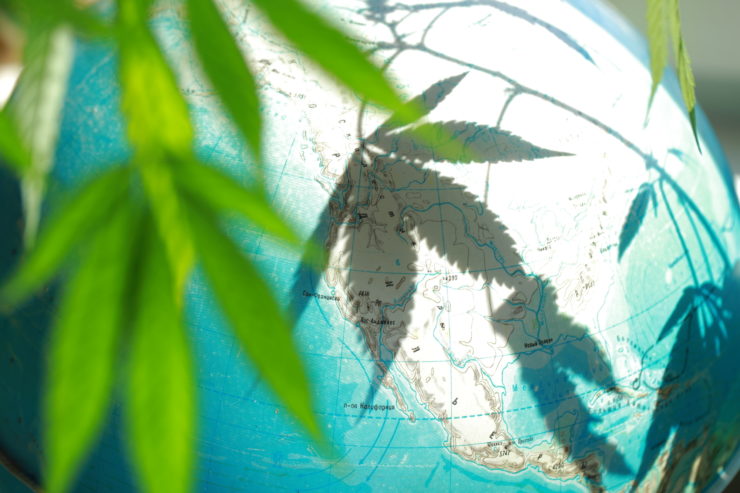
We like to check in from time to time on what’s happening with marijuana legalization around the world. To date, there are something like 40 countries that have legalized marijuana for medical use. Many more countries have decriminalized marijuana for recreational use in various amounts, and a few have straight up “legalized” recreational marijuana. Among these bellwethers, South Africa and Georgia allow for possession and consumption but no sale; Uruguay, conversely, has a quasi-commercial model; and Canada is leading the charge with a bona fide, scaled marijuana economy.
It’s important to remember that there are any number of approaches governments can take with respect to cannabis, and that the options are not merely prohibition, medical marijuana and/or recreational marijuana. Instead, options progress along a continuum similar to the one shown below:

When it comes to countries moving toward a standard commercial model for recreational marijuana, I mentioned in a recent post that Mexico, Luxembourg and Switzerland are all headed that way. Below is an update on each country’s progress.
Mexico
Just a few months ago, it seemed certain that Mexico would legalize marijuana for recreational use before December 31. That still hasn’t happened, and it now seems like legalization will have to wait for 2020. It will definitely happen though.
For North American observers, the Mexican story is novel because Mexico will legalize both federally and by judicial fiat. In the U.S., conversely, states have led the charge in defeating prohibition, either through initiatives or occasionally by legislative action (courts have declined to effectively deal with prohibition so far). Canada legalized legislatively at the federal level, with no meaningful judicial involvement.
How did Mexico get there? Exactly four years ago, I explained that Mexico’s Supreme Court ruled it was unconstitutional to ban the possession or use of recreational marijuana. That ruling has since been replicated four times, which compels legislative action under La Constitución. The fifth and final ruling came on October 31, 2018, and it required Mexico’s Congress to provide the framework for a legal adult-use environment within one year.
Like any good legislature, Mexico’s Congress sat on its hands until just before the deadline, before finally proposing a law. The high points are as follows:
- The handsomely named “Instituto del Cannabis para la Pacificación y Reconciliación del Pueblo”… would oversee the legalized industry.
- Persons 18 years and older can buy and possess cannabis.
- Edibles and infused beverages can only be bought by medical marijuana patients.
- There will be strict packaging regulations, à la Canada.
- Public consumption esta prohibido.
- Large businesses would not have priority in obtaining growing, processing, or retail licenses.
That last point incited some emergency lobbying, and the Mexican Senate duly approached the Supreme Court for an extension. On November 1, the Court granted that request, extending a “one time only” legalization deadline out to April 30, 2020. Hopefully it doesn’t take that long, but the smart money now says that approval won’t occur until sometime between February and April, during Congress’s spring session.
Luxembourg
Legalization of recreational marijuana has been on the Luxembourgian agenda since late 2018, when the government released a 250-page coalition agreement in support of the change, and held a press conference to discuss the country’s plans for legalization. Luxembourg reportedly plans to expand upon its medical marijuana program to pursue a Canadian-style model, although sales will be limited to the Grand Duchy’s 600,000 residents. Luxembourg’s announcement was remarkable when issued, as no other European country had sought to formally permit and regulate adult-use marijuana nationally.
Recently, it was announced that authorities have been working out details for the plan, and that the legislative process could begin before 2020. Although no major roadblocks are expected, it’s likely that implementation of Luxembourg’s new program won’t occur until closer to 2022. One contributing factor to this deliberate pace is that the entire Luxembourgian production and distribution chain will be domestic; another may be treaty and policy implications with respect to the European Union in general.
Switzerland
In February of 2019, the Swiss government proposed a limited pilot project to allow up to 5,000 people to smoke marijuana, in order to help shape rules for prospective recreational use. Shortly thereafter, a Swiss advisory Committee also recommended that Switzerland legalize and regulate its recreational marijuana market. A companion proposal would expand the country’s medical marijuana program.
Switzerland is unusual in that cannabis products of less than 1% THC are currently allowed. The proposals at hand are geared toward moving the country into a more coherent and progressive position as to marijuana, especially given government estimates that some 200,000 people in Switzerland use illegal cannabis. Switzerland will likely keep a close eye on what happens in Luxembourg as it charts its own path toward ending prohibition.
For more on international cannabis developments, check out our international posts, including the following:



